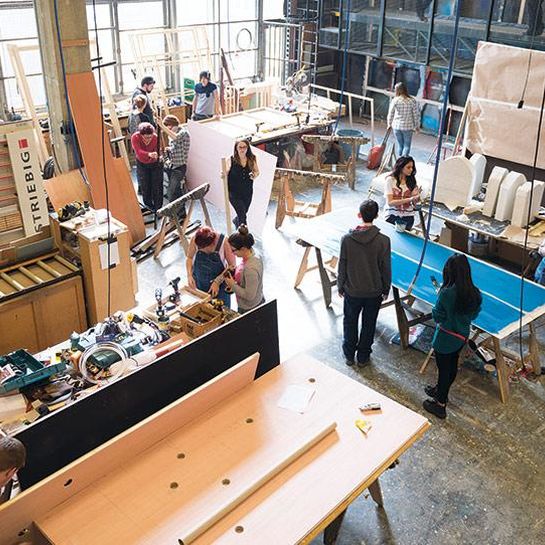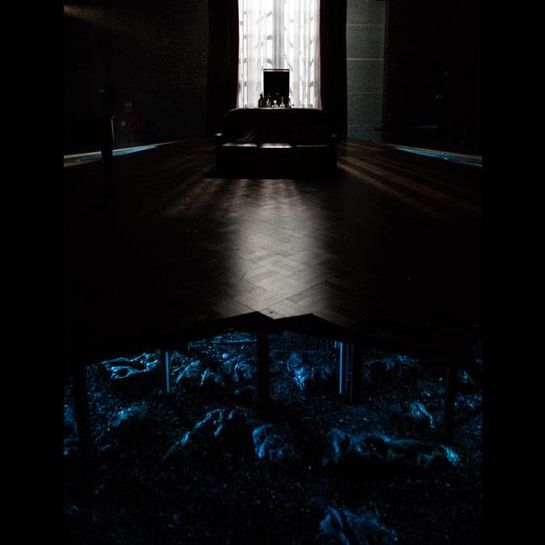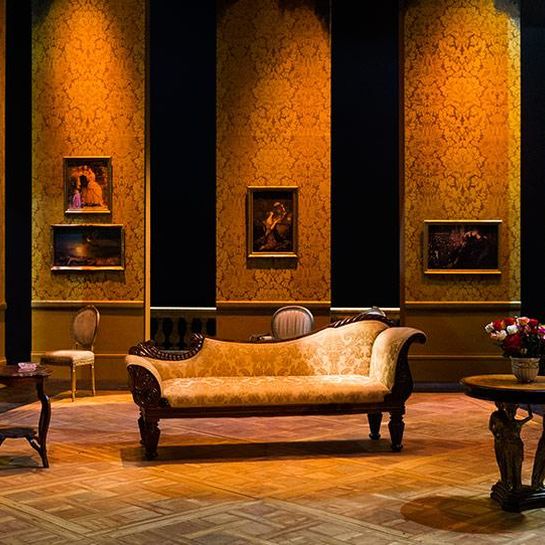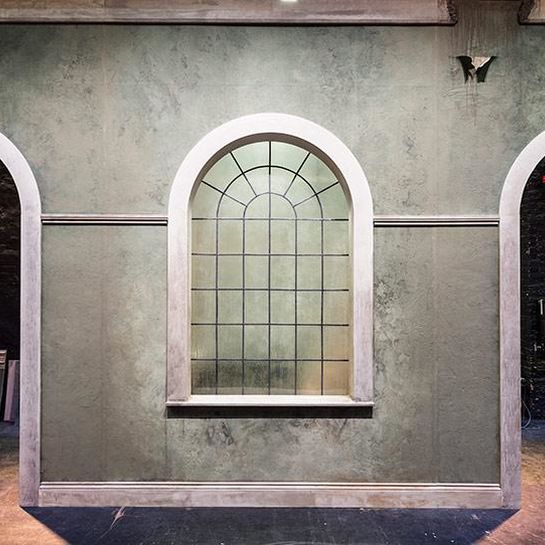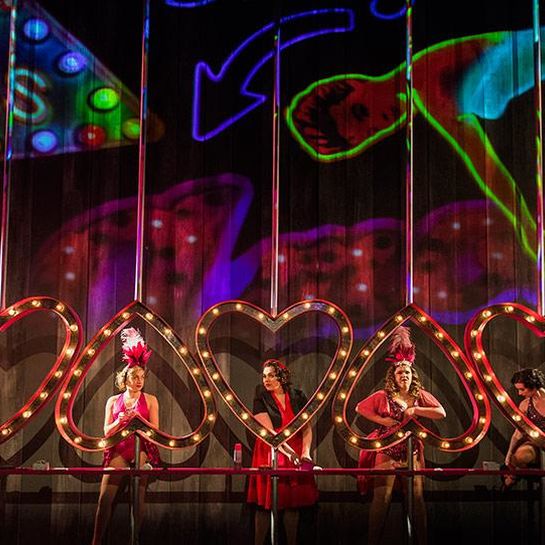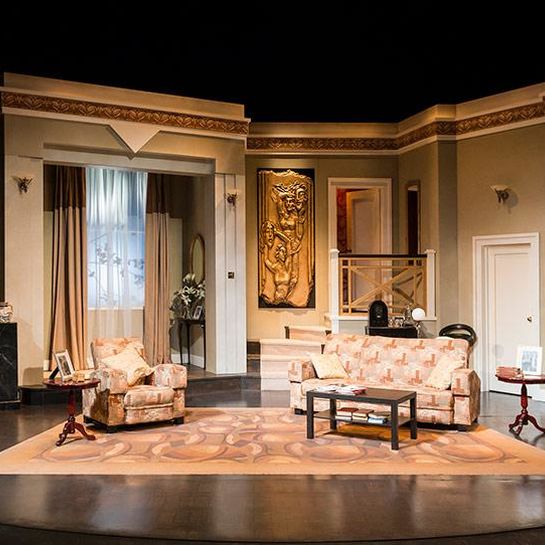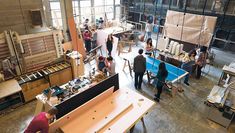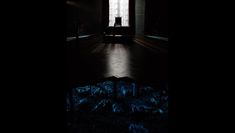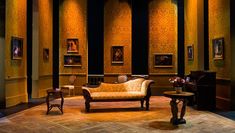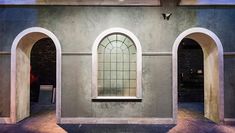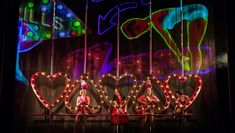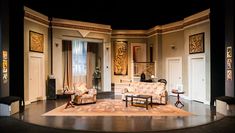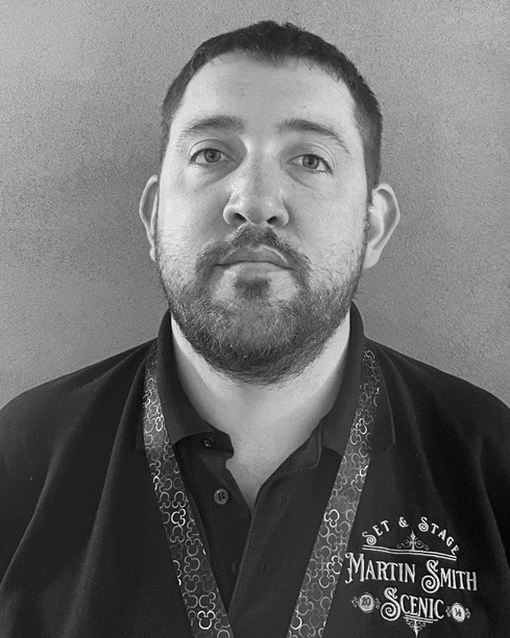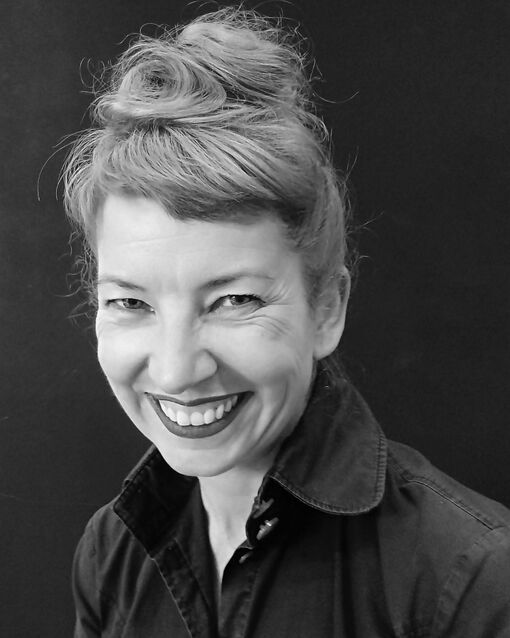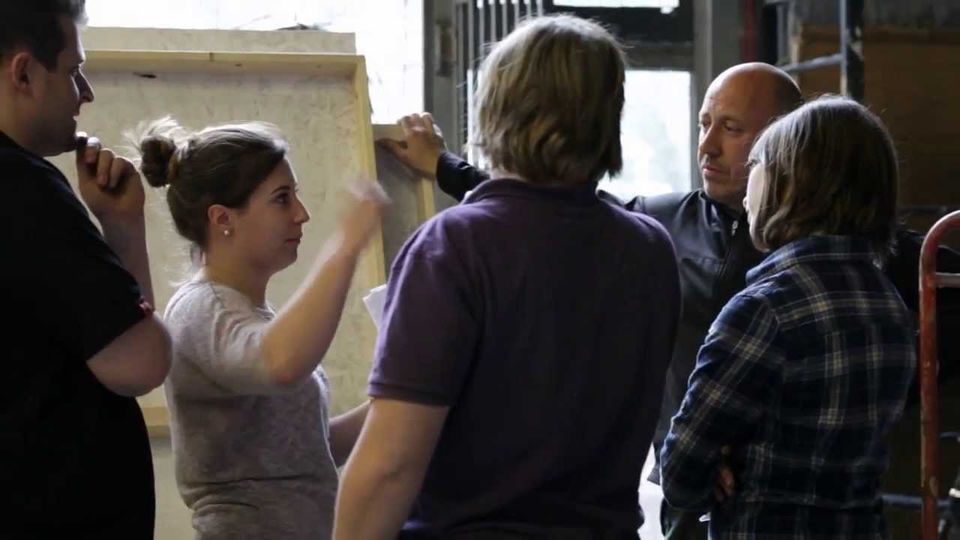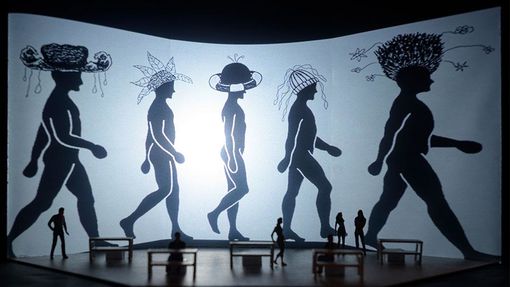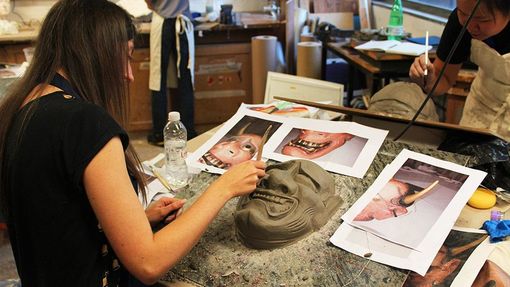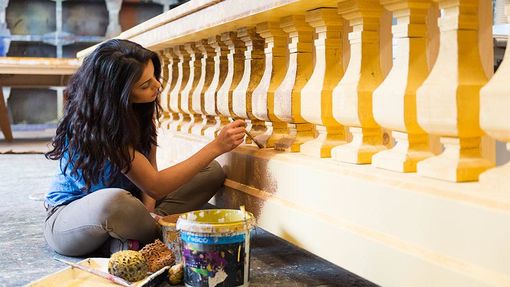Course information
UCAS code
Buttons
About this course
Studying on the Set Construction for Stage and Screen specialism of the BA (Hons) Theatre Practice degree course, you will:
- Learn traditional construction skills and experiment with newer materials and techniques
- Plan and build sets for a variety of contexts including theatre, film, television, events and advertising
- Undertake work in a professional setting within the industry
Who are Set Constructors?
Set Constructors are creative problem solvers who use ideas and solutions that are drawn from engineering and industrial practice to aid the creation of sets or staging.
Set Construction at Central
The Set Construction for Stage and Screen course is ideal for students seeking a creative arts-based career, including an interest in building with wood and metal.
You will learn to work independently and be resourceful, and will develop specific scenic construction skills to the high professional level required to meet design briefs and the requirements of the industry in which you plan to work. The training will principally be in theatre, but these skills are widely transferable to many different media environments including theatre, film, television, events and advertising.
From the second year of the course you will have the opportunity to work in professional contexts, for example, constructing scenery for a professional venue, working with a major scenery building company, or with companies working in events, television or advertising.
You will collaborate on projects which offer experience in the varied and diverse areas in which you can work upon graduation, including television and film.
Opportunities on the course
A variety of other opportunities come through the network of graduates well placed in the industry and contacts made with the professional designers with whom you will work on public productions at Central.
Second-year Entry
You can apply for second-year entry to this course if you have already undertaken first year study at another institution on a relevant course, taken a HND and HNC qualification or have relevant experience. Please contact openevents@cssd.ac.uk to find out more
Accordion
-
Course Detail
Year 1: Exploring and learning specific skills
- Exploring and learning specific skills in a variety of materials, including woodworking tools, hand-held tools and machinery.
- You will build specific elements of scenery, working to a professional designer’s specifications and working closely with technicians to plan how scenery might be rigged to fit within either a studio or a main house space.
- Learning carpentry techniques, you will work as part of a team, building or adapting scenery.
- You will also have an introduction to AutoCAD and learn basic technical drawing.
Year 2: Further skills development
- You will continue to develop AutoCAD skills and work on welding and building metal work structures, as well as working with automated scenery.
- Work individually or as part of a team, to construct a set for a public productions.
- You will also have the opportunity to work in a professional context within the industry.
Year 3: Focus on professional development
- You will undertake the role of Head of Department on a full-scale realised production in Central’s Embassy Theatre or Webber Douglas Studio, manage other students building scenery and coordinate with all members of the creative and production team.
- You will work on a personal project or placement that is focused on your main individual area of expertise.
- Project work is chosen and negotiated to fit with your desired career path.
- You will participate in a public exhibition presenting your work to invited industry employers and others.
-
Industry Links & Placements
Placements
From the second year onwards, you will have the opportunity to arrange placements and there are a wide range of professional companies that work with Central, allowing access to many performance styles.
Through placements in the second and third years, students have worked on productions with:
- The Royal Shakespeare Company
- English National Opera
- Blackfriars Scenery
- Scott Fleary
- Shape Construction
- East London Furniture.
Students regularly undertake placements at the Royal Opera House and All Scene All Props.
Industry Links
Through the links the course has established with other industries, such as festivals, events and theme parks, students have been able to broaden their scope of skills and expertise by working on a diverse range of projects.
The course has links with established scenic workshops, such as:
- Scott Fleary
- Britain’s Got Talent
- The Curious Incident Of The Dog In The Night-Time
- All Scene All Props
- Closer at the Donmar Warehouse
- Kinky Boots at the Adelphi Theatre
- Clockwork Scenery
- Who’s Afraid Of Virginia Woolf at the Theatre Royal Bath
- Adobe Summit 2016.
Alumni have also successfully started their own companies, which offer opportunities for graduating students such as Illusion Design and Construct, as well as working on the Sherlock Holmes installation at Madame Tussauds, and the David Bowie Exhibition for the Victoria and Albert Museum and world tour.
-
Graduate Employment
Graduate employment and career pathways include:
Scenic Constructor, Watford Palace Theatre.
Founder members of companies, Illusion Design and Construct.
Internship, Royal Shakespeare Company’s Engineering Department.
Freelance Scenic Constructor, English National Opera, Bower Wood Production Services, Hedgehog Construction, English Touring Opera, Almeida Theatre, Battersea Arts Centre, The Bush, Donmar Warehouse, The Gate, Hampstead Theatre, The Kiln Theatre, Lyric Hammersmith, Royal Court, Soho Theatre, Theatre Royal Stratford East, the Unicorn, The Yard Theatre and Young Vic.
Tutor, Royal Academy of Dramatic Art.
Head of Engineering, Scott Fleary.
Touring Carpenter, The Phantom Of The Opera.
-
Notable Alumni
Michael Ackland-Lang (2015) has experience working in professional scenery workshops, including; Scott Fleary Ltd, Capital Scenery Ltd and Footprint Scenery.
Daniel Hughes and Rory Evans (both 2011) are co-founders of Illusion Design & Construct, a specialist company building sets for awards ceremonies, exhibitions and productions. Over the past few years they have worked on Secret Cinema’s immersive events, bringing to life the worlds of classic television and film productions including, Stranger Things, Blade Runner, and Star Wars.
Nils Schuller (2011) is Commercial Director of Scott Fleary Ltd, a company building high standard craftsmanship scenery for a wide spectrum of the entertainment and arts industry. Their clients include, BBC, CNN, BAFTA, The National Theatre and Nimax Theatres.
-
Recent Visiting Professionals
Roger Harrison, Sam Greenfield, William Floyd-Maclean, George Stephens, Sara Perks, Sarah Beaton, Andy Shewan, Sam Dowson, Bob Bailey, Rory Evans, Nigel Hayne, Philip Engleheart, Andrew D Edwards, Michael Taylor, Sophie Skelton.
-
Entry Requirements and Admissions
Minimum Entry Requirements
Our standard academic entry requirements range between 120 and 64 UCAS tariff points. As part of meeting these tariff points, we consider a range of qualifications including A Levels, BTECs, T Levels and many more. You can see how many tariff points your qualifications would gain on the UCAS Tariff Calculator. International qualifications and others not covered within the UCAS tariff can also be accepted. Please email us if you need further clarification.
Please note that we make lower offers (including unconditional) to exceptional candidates and those who have alternative or prior experience to offer. All candidates invited to interview are asked to bring a portfolio. Interview and portfolio are key factors in determining which applicants are accepted on to the course.
Admission with Academic Credit
For information on alternative entry requirements please see www.ucas.com.
Application Details
See How to Apply section for Undergraduate courses.
We particularly encourage applications from groups currently under-represented in higher education, such as students with disabilities and members of Black, Asian and Minority Ethnic groups. Find out more information on Central’s commitment to equality and diversity.
Interviews
Find out more about the interview process for this course.
International Interviews
Each year Central hosts a number of interviews outside of the UK, with a team of tutors from Central travelling to meet applicants. The international interviews are designed to replicate the London-based interview experience in every aspect (other than a tour of our site!). See our Event Finder for listings of upcoming interview locations and dates.
International Students
Visit the International Students section to view details of English language requirements for Central’s courses.
-
Tuition Fees, Bursaries and Scholarships
Tuition Fees for 2024 Entry
UK (Home) students: £9,250 per year*
Overseas students: £25,200 per yearPlease note that there may be additional costs that you need to incur as part of the training for the course.
Full information is available on the Tuition Fees and Additional Costs page.
Bursaries and Scholarships
Central offers a range of bursaries and scholarships. If you are holding an offer for a place on a course then you will be invited to apply for a bursary or scholarship.
UK-based undergraduate students who are applying for a student maintenance loan and have a household income under £35,000 will automatically be awarded our Access to Central Bursary.
*If you are a UK student but already hold a qualification at the equivalent or higher level to the one that you are applying for, then you may be classed as an ELQ student and be required to pay the same fee as an overseas student.
Student Feedback
“The course at Central was really helpful to show us all the various aspects of scenic construction, as well enabling us to learn skills in budgeting, scheduling and working closely with other departments on public productions. The hands-on approach to learning benefits you professionally, along with the skills learnt whilst undertaking placements within the industry.”
Martin Smith
Graduated 2016, freelance scenic constructor and has worked as Chief Carpenter at Millfield Arts Centre and Theatre Royal Stratford East.
Staff On The Course
Martin is a lecturer on the Set Construction for Stage and Screen, BA course at the Royal Central School of Speech and Drama.
Kathrine Sandys is a scenographer, researcher and academic.
UniStats Widget
Course Video
You may also be interested in
The course develops practitioners with a strong sense of direction and identity, and an ability to think conceptually. From the first year you undertake speculative design projects that will challenge and test ideas in a broad range of performance contexts, from text-based drama to opera, dance, site-specific performance and installations, under the guidance of professional directors, designers and choreographers.
The Prop Maker will work with designers and directors to produce bespoke items for individual requirements. It is rare to make the same thing twice, so the Prop Maker has to be ingenious, quick-thinking, explorative, dexterous, enjoy problem solving and have a love of materials and all things three-dimensional.
The role of scenic artist requires excellent artistic skills, combined with the ability to work independently, or as part of a team, accurately and to deadlines, meeting design specifications agreed with the set designer or art director. On the Scenic Art specialism you will gain experience of working in a wide range of materials, textures, scenic finishes and effects enabling you to interpret the design to the level of finish expected by contemporary audiences.

